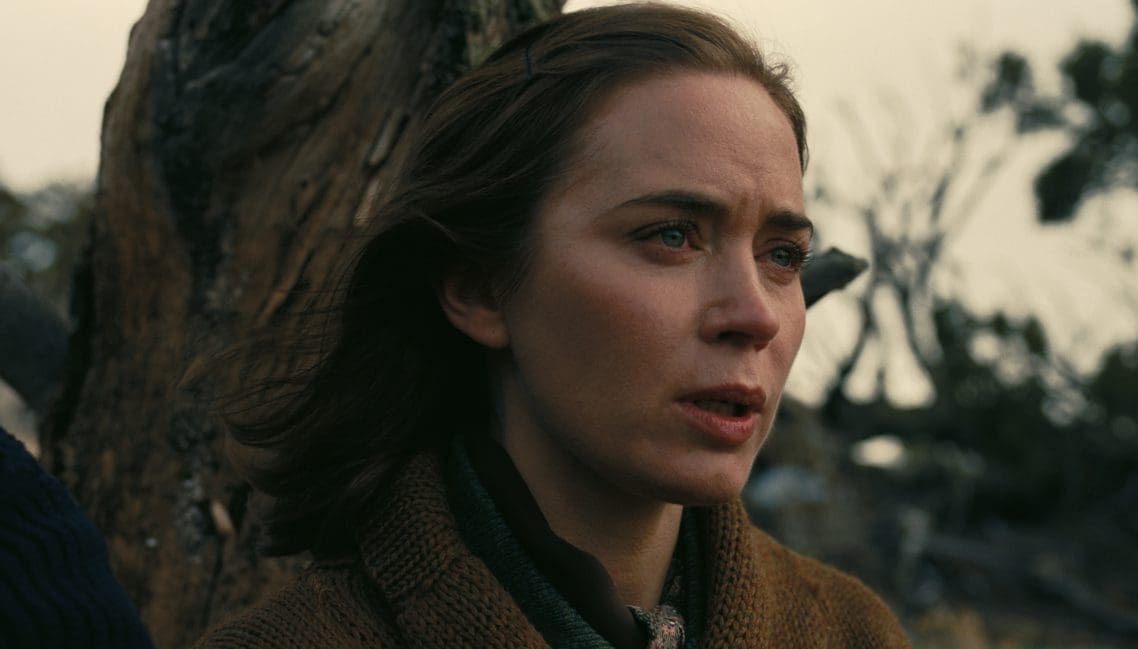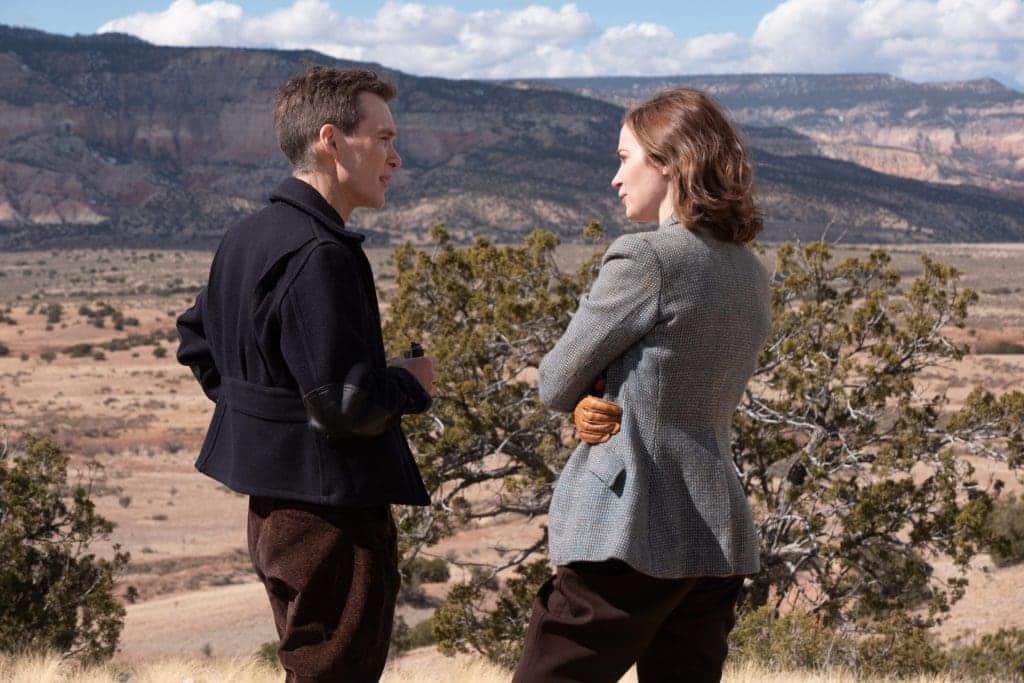
“I hope you are nicer than she is.” Emily Blunt is excited to learn that I share a name with her character in Christopher Nolan’s 2023 blockbuster Oppenheimer. Katherine “Kitty” Oppenheimer is the wife of Robert ‘Father of the Atomic Bomb’ Oppenheimer played by Cillian Murphy. A well educated scientist and former member of the Communist Party herself, Kitty’s potential is hopelessly unrealised as a housewife and she turns to alcohol. Whilst the double-billing of Barbenheimer posited Greta Gerwig’s Barbie and Nolan’s Oppenheimer as opposites, the character of Kitty serves as a point of commonality. The 1950s doll as a vision of liberated femininity finds her shadow in Nolan’s miserable mid-century women, who also include Jean Tatlock, Oppenheimer’s lover (played by Florence Pugh) who ends up drowning herself. While I am offended when Blunt suggests that I am also dressed a little like her character (I immediately regret the Fair Isle jumper), there is also a lot to be admired about Blunt’s Kitty. As with so many other roles Blunt plays, she steals the film with a gnarly bite and determination that seeps through a patina of desperation. At the Corinthia Hotel on a dark November afternoon in London, I spoke to Blunt about playing abject women, being empathetic and why she wants to make a film about a stutterer.
Kitty Grady: Your character, Kitty, has this incredible life, but you have much less screen time than Cillian Murphy [as Robert Oppenheimer]. What parts did you and Christopher Nolan want to bring out of her?
Emily Blunt: I found her wildly complicated and quite hard to sum up in a few words. But then I think most human beings are. Even the incredibly volatile and difficult ones, which [Kitty] was clearly prone to being. I also feel as an actor, it’s never really been that important to me— the amount of screen time. It’s always what you do with it. And Chris [Christopher Nolan] wrote a rather startling force of a person. So I felt that in every scene, there was a lot to chew on.
My scenes with Cillian were all very visceral and quite emotionally charged. And very much emblematic of their marriage, which was ultimately a success, however tempestuous it was. Chris was always incredibly curious about what I wanted to bring to it and why I saw the scene in that way. I think sometimes directors who’ve written the script, they can straitjacket you a bit with some kind of presupposed idea of what they thought she would be like. And I don’t feel that with Chris, and I don’t think any of the actors felt that. I found her really exciting. I did think she was a bit of a legend.
KG: I wanted to ask you about the trial scene, where you dress down the lawyer. It’s an incredible moment for Kitty. A scene-stealer. Can you talk about it a bit more?
EB: I’d love to. On the page, it read like an exhilarating scene. As the person playing her, I felt grateful she had a moment of reclamation of that brilliant brain of hers which had become so addled by alcohol and bitterness and resentment and frustration. She was just sitting there watching this trial happen and her anger was festering. But they needed someone to come in and just rip the face off this guy. She’d proven herself to be so unpredictable and unreliable and she’s barely walking in a straight line so you feel she might choke. And in playing her, I felt she might choke. And I remember Jason Clarke, who was such a fantastic dance partner for those being interrogated by him. It wasn’t in the script, but he said to Chris beforehand, ‘I think I’m going to move my chair really close to her and try to intimidate her’. And I felt myself bristle with it. It created the best reaction… that toxic male thing of intimidating you with my size and physicality.
KG: What I love about many of the characters you play—whether it’s in The Girl on the Train or The Devil Wears Prada—it’s that they are these underdog women who are a bit abject. But they are also these Cassandra figures who tell the truth but aren’t believed. Are you drawn to them for the same reason?
EB: I want to play people who are conflicted about the choices they make and the choices others make, and I want to play women who are bursting at the seams with this conflict in them. But then I think no one has it all worked out. Nobody feels like they’re standing on solid ground. I want to see someone with the courage to fight themselves out of situations, however much they might be deemed unlikable. I’ve never been terribly interested in the word “likeable”. I just have to understand these people and empathise with them and see, try to create a whole shadow of someone’s life as to why they are the way they are.

Emily Blunt and Cillian Murphy in Oppenheimer (2023). By Christopher Nolan.
KG: And it works. Someone like Emily in The Devil Wears Prada, her character has stood the test of time, even more than Andy.
EB: That film gets quoted to me every week. I mean, I think you could have put her down as being some awful person, but I felt she was just brimming with desperation and insecurity, where you’re completely defined by the identity of your job. And so without it, she’s literally nothing. I just saw her as someone who is white-knuckling it. And that’s more interesting than someone who’s just bitchy.
KG: It’s the sort of thing that happens to women more than men, but are you ever worried people will equate you with these characters?
EB: I do try to mix it up with nice people as well! My character in The English—I was so in love with her. I just thought she was so guileless and loving and even in the face of great trauma. And the character in Pain Hustlers is interesting because she made really amoral choices and had to put her feet to the fire and make the right one in the end. People make terrible choices and say terrible things—it doesn’t make them bad people. But yeah, I obviously want people to feel they can always approach me. I don’t want to be mirrored with my characters. The main thrill of what I do is to keep looking through a bag of tricks and see who else I could play.
KG: I was interested to read that you have a stutter, which might surprise people, since you are an actor, which is obviously a career choice you’d associate with confidence.
EB: I try to destigmatise stuttering because I think it is a disorder that’s really misinterpreted as a nervous disposition or a psychological disorder. But it is a disability that’s actually hereditary, neurological and biological. It is to do with your brain—it’s not to do with your sense of self. It’s not to do with an environment triggering you. As a kid, I didn’t know that much about it. So there’s a huge amount of shame around having a stutter, because you really feel weak. A lot of actors have stutters—James L. Jones, Bruce Willis, Samuel L. Jackson, Harvey Keitel—I’ve dragged all of them to my foundation every year. I think when you’re creative or when you play someone else, you access a different part of your brain. You and I are using ABCD parts of our brain now, but I think if you fully embody someone else or you immerse yourself in something creative, apparently it’s this ethereal thing. It unlocks a different neurological pathway, which, I think, is why stutterers speak fluently when they’re acting. Or maybe by just being someone else. You’re not having to be yourself in this state of presentation or persuasion. It’s weird.
I don’t want to be mirrored with my characters. The main thrill of what I do is to keep looking through a bag of tricks and see who else I could play.
KG: You and your husband [John Krasinski] have been collaborating on producing films. Are there any stories you would want to tell from behind the camera?
EB: To tell the story of a stutterer, I think. It’s the kind of thing I’d like to raise awareness of. I mean, it doesn’t have to be with John. It could be with anyone who wants to collaborate. We saw it with The King’s Speech, and I thought Colin [Firth] was just brilliant and I thought Leonardo [DiCaprio]did an amazing job in Once Upon a Time in Hollywood. But I would like to see more of the trauma of what it’s like for kids and adults to live with.
KG: I read that you have also been taking some time off from acting?
I said that in a casual way, that I’d take a bit of downtime… But it turned into, like, are you quitting? No, I would never! I am madly in love with this job. But I just felt last year was quite busy and I was ready for a little break. I’m a great drifter. And when I don’t get to drift for a while, I miss it. It’s good for the soul. And to be present for my daughters has been amazing. As they get older I think you become more needed and leant on and necessary to them.
KG: Did playing Kitty make you reflect on motherhood?
EB: I mean, she’s a terrible mother. But you know what? Some women are not meant to be mothers. And certainly women back then, you had to subscribe to Good Housekeeping and be a very particular way. But she wasn’t, and I don’t think she ever really wanted children. And I gather the dinner parties at the Oppenheimer house were just sort of vodka and cigarettes.
KG: That is actually an interesting motif in the film, isn’t it? Food and eating. They just don’t nourish themselves.
EB: No, they don’t. And he’s got this tremendous brain and she’s got this tremendous brain. And it sort of becomes more about what they do to try to dull out the trauma of living with a brain like that. But yeah, Kitty was not known for her mothering skills. I remember the first scene where I was driving with my son. And I remember, the actor was this little two-year-old. And two is the worst age to hand your baby to a stranger. He was kicking off and screaming in the first take and Chris loved it because it made her look like such a shit mum. So I started singing Peppa Pig songs and he fell asleep. And for the next six takes he was snuggled into me. But Chris said he would use the first take because it made me look so terrible.



